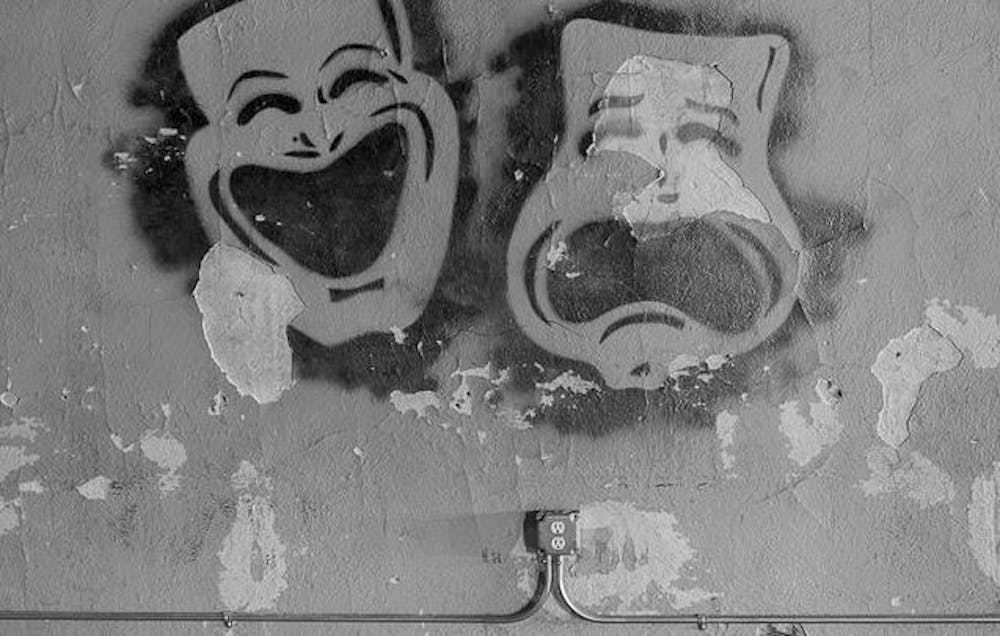I’ve recently been the unwilling participant in a (not-so) mysterious game against myself. The game, which has lasted a few weeks now, is simple: at every moment I am equally as likely to sob as I am to emit a (loud) cross between a chuckle and a cackle. The bit is that I don’t know which one will emerge in any given moment, a dash of anxious spontaneity I never asked for but experience nonetheless. And, sadly, there’s no prize at the end—only the unavoidable pity in the eyes of a stranger observing my face (which looks something like the image above) in Pitchforks. If one wanted to psychoanalyze me, they could point out the pressures of classes or relationships collapsing in on me, and classify my game metaphor as a useful distraction from actually unpacking and addressing my own issues. On the other hand, pursuing such deep introspection sounds like hard work. Thus, when I walked into Mad Hatter’s last Thursday to catch up with a former professor, I remained in the thick of my game-like fantasy, desperately worried my ugly crying face would emerge and she’d be forced to witness it.
Imagine my surprise, then, when within moments of us sitting down to talk, everything—fears, anxieties and a few droplets of saliva—spilled onto the table. I talked about second-guessing my decisions in planning an event, my complicated study abroad feelings, and the insecurities I felt in my friendships. The emotional balancing act that had dominated my daily life for weeks slowly dissolved as she held space for me to blather, rant and process. She didn’t let me off the hook, though—she probed, asked difficult questions, provided support and affirmation. When we finished and walked out of Mad Hatter’s, I felt relieved leaving that frothy mixture of saliva and insecurity behind.
I could not have survived some of my most difficult moments at Duke without mentors like this professor—mentors who were willing to critique, validate and offer their own versions of dealing with self-created game show metaphors. I remember my first year, for instance, drinking coffee on a plaza outside Perkins with someone older than me, a person who would become both a friend and mentor, as I told them about my ill-conceived project idea around workers’ rights at Duke. They would have been entirely justified in leaving me at that table without a word and never speaking to me again. Instead, miraculously, they stayed and offered gentle yet critical feedback, shared a brief history of labor activism at this University, and left me with the entirely sensible advice to read one, two or maybe ten more articles before trying out a new idea. While first-year me was probably a little stunned, I think we are all grateful to this friend that they checked me early.
Over time, I realized I was incredibly lucky and thoroughly undeserving of the mentors in my life—my parents, friends, professors, activists. My appreciation for them grew because without their care and guidance I wouldn’t have figured out that my true love was history, not public policy, that I could participate in meaningful anti-poverty work in my local community, or that attending CAPS was a necessary step for me to take. They provided examples of moral courage, humility and how to be not-completely-cynical about Duke or the world. Without them I could not be here (both literally at my computer and in a grand spiritual sense), and there is no way I can adequately repay them.
Nonetheless, I know I must somehow attempt to make good on the love they showed me. I believe we are each responsible, in our own ways, for pouring whatever love, knowledge or support we’ve been given into those who come after us, whether it’s a sibling, a first-year in your SLG, or it’s through a program you create that will benefit Duke students long after you leave this campus. It’s a type of mentorship and community-building that goes beyond mere networking but rather a commitment to building relationships that make surviving this University a little bit easier. If done well, these relationships aren’t just a one-way exchange but reciprocal, a place to be vulnerable and collectively sharpen one’s thoughts and beliefs. A shared, meaningful relationship requires that both mentor and mentee recognize that they can learn from each other—that gaps in age or knowledge don’t necessarily weaken the validity of one’s insight or analysis. The mentors I’ve admired most, and in turn the relationships I treasured most, respected me as much as I respected them.
This is the charge I’ll attempt to carry with me in my last year at Duke. The mentorship I received has left me determined to muster the resources and knowledge I do have and pass them on—a position I never imagined I’d be in when I first stumbled onto campus. I’ll share the classes I loved (and hated), the stories of brilliant students, workers and community members who held Duke accountable, and the absolutely crucial advice to immediately become friends with Duke’s librarians. I’ll try to listen, refrain from making dad jokes, and be there for performances, rallies or the Gardens on warm Sunday afternoons. I don’t imagine I’ll always do it as well as my former professor did for me last Thursday. Frequently, in fact, I make situations worse. But, at the very least, I know I can always commit to keep learning and showing up.
Gino Nuzzolillo is a Trinity junior. His column usually runs on alternating Tuesdays.
Get The Chronicle straight to your inbox
Signup for our weekly newsletter. Cancel at any time.

